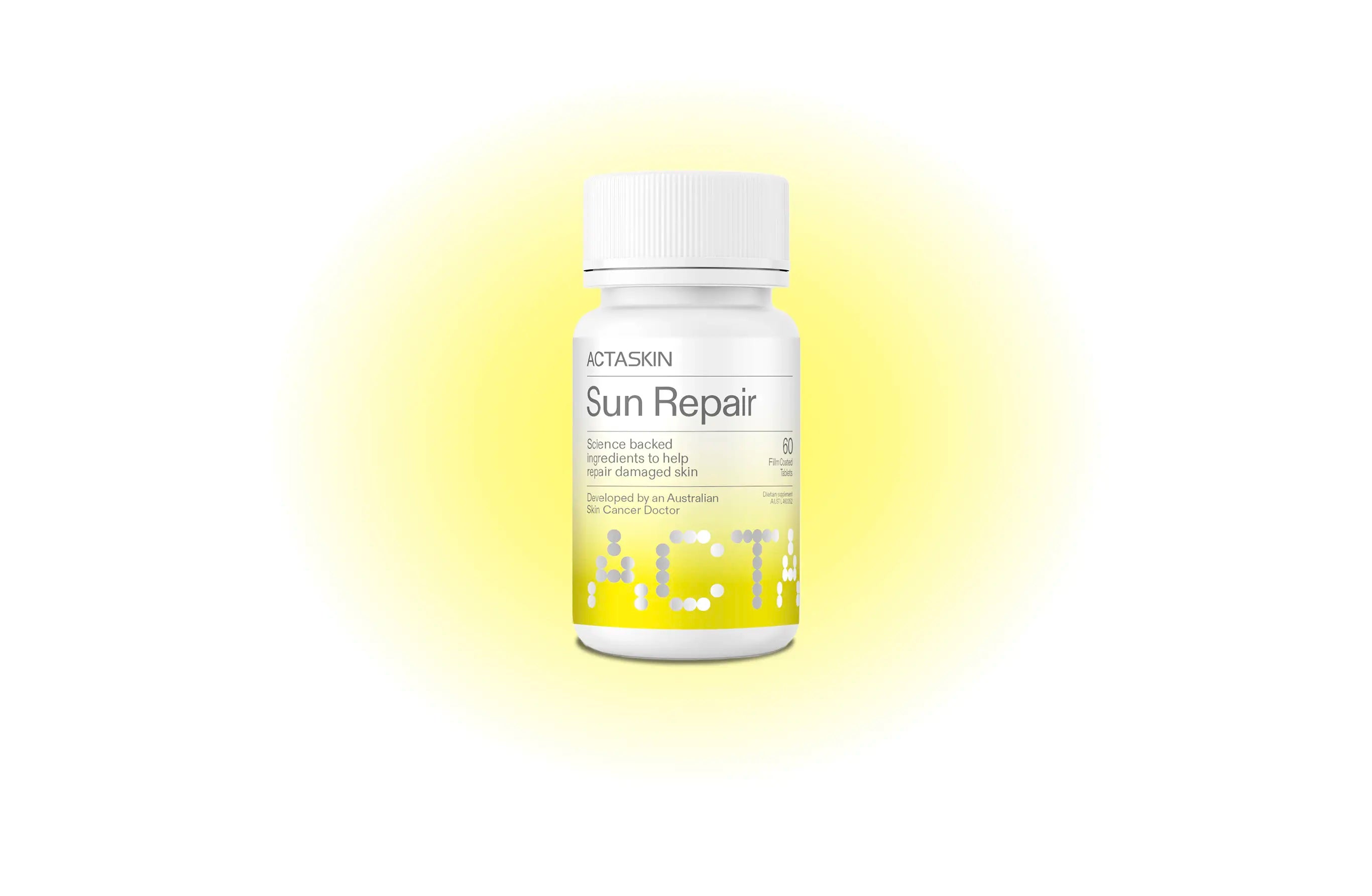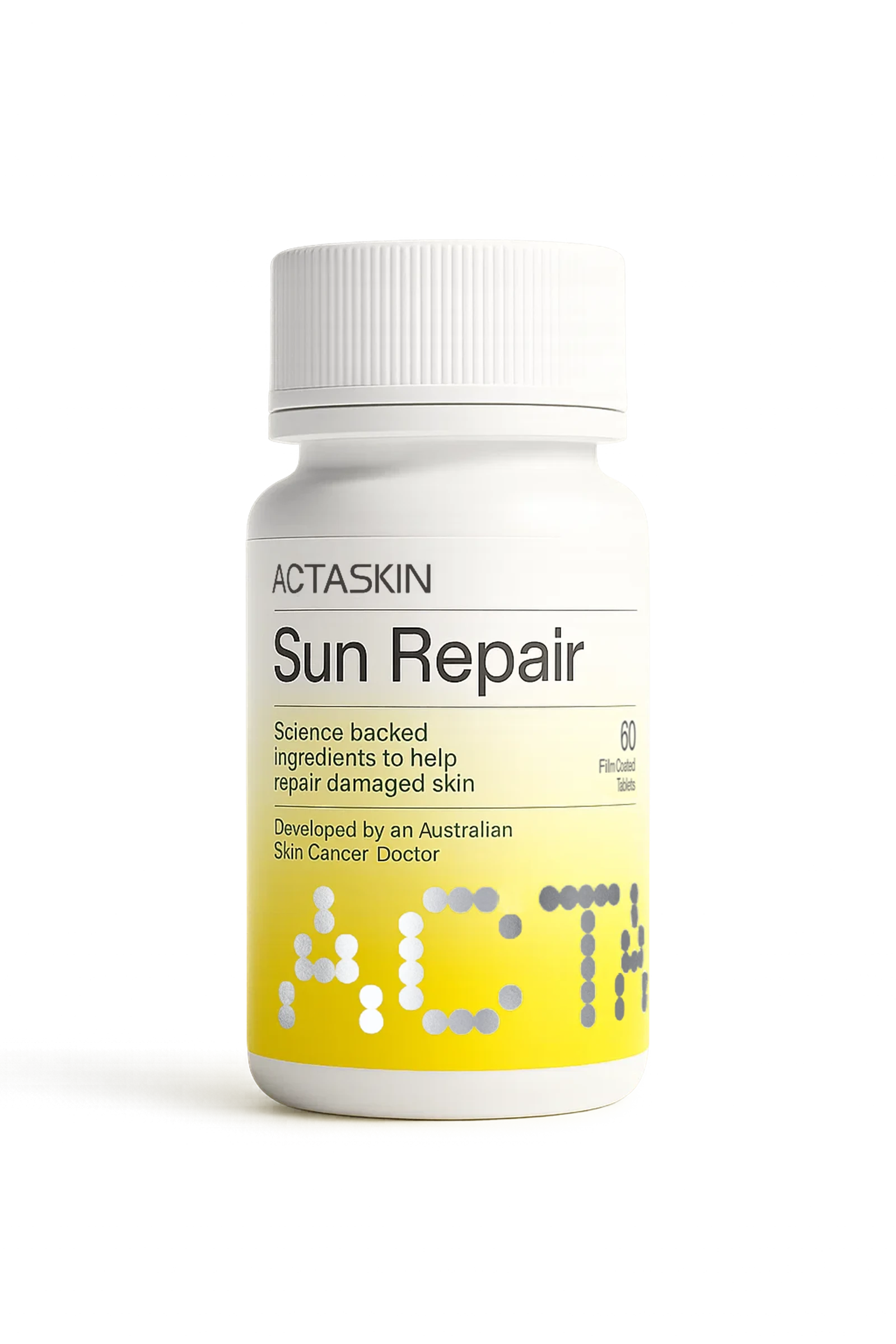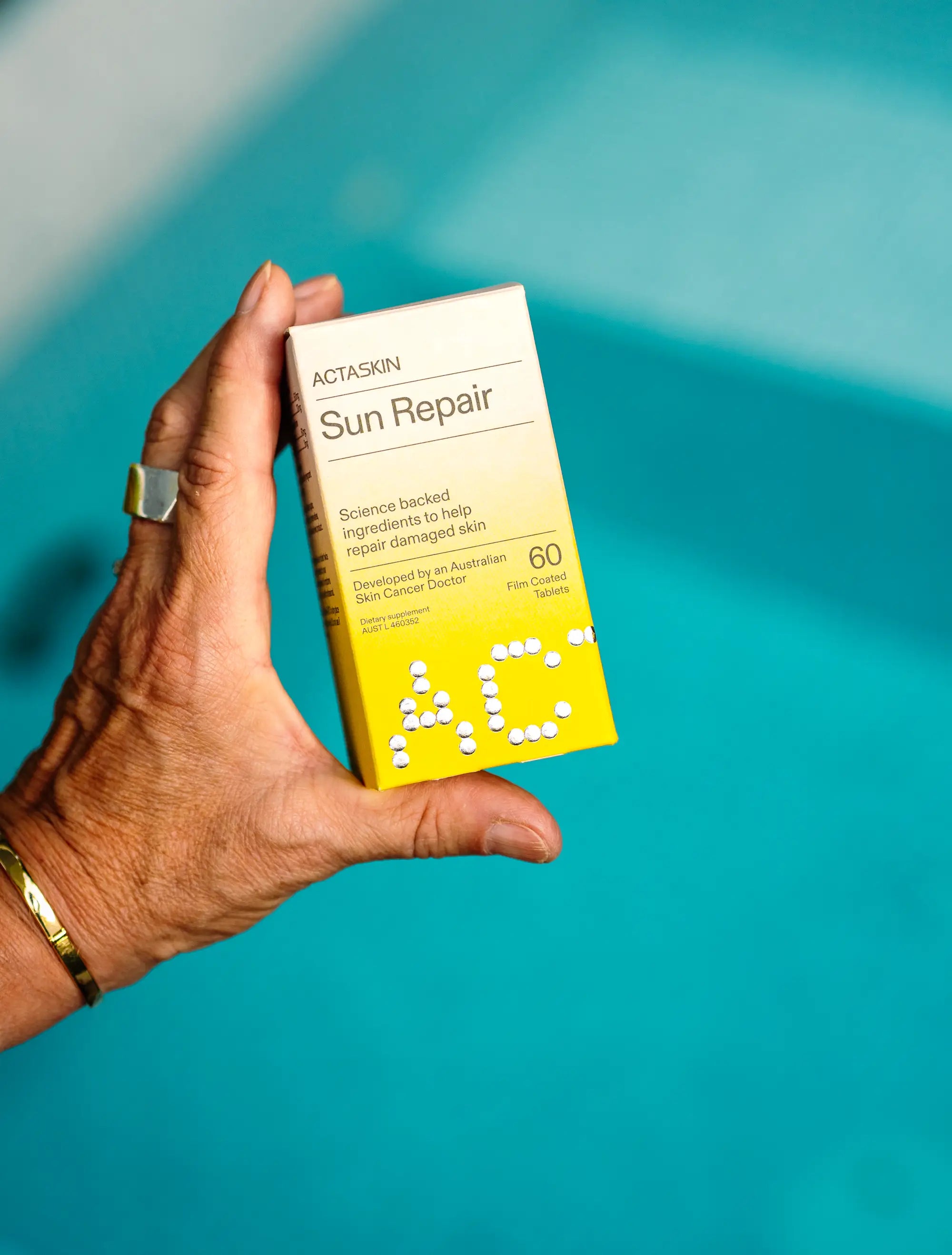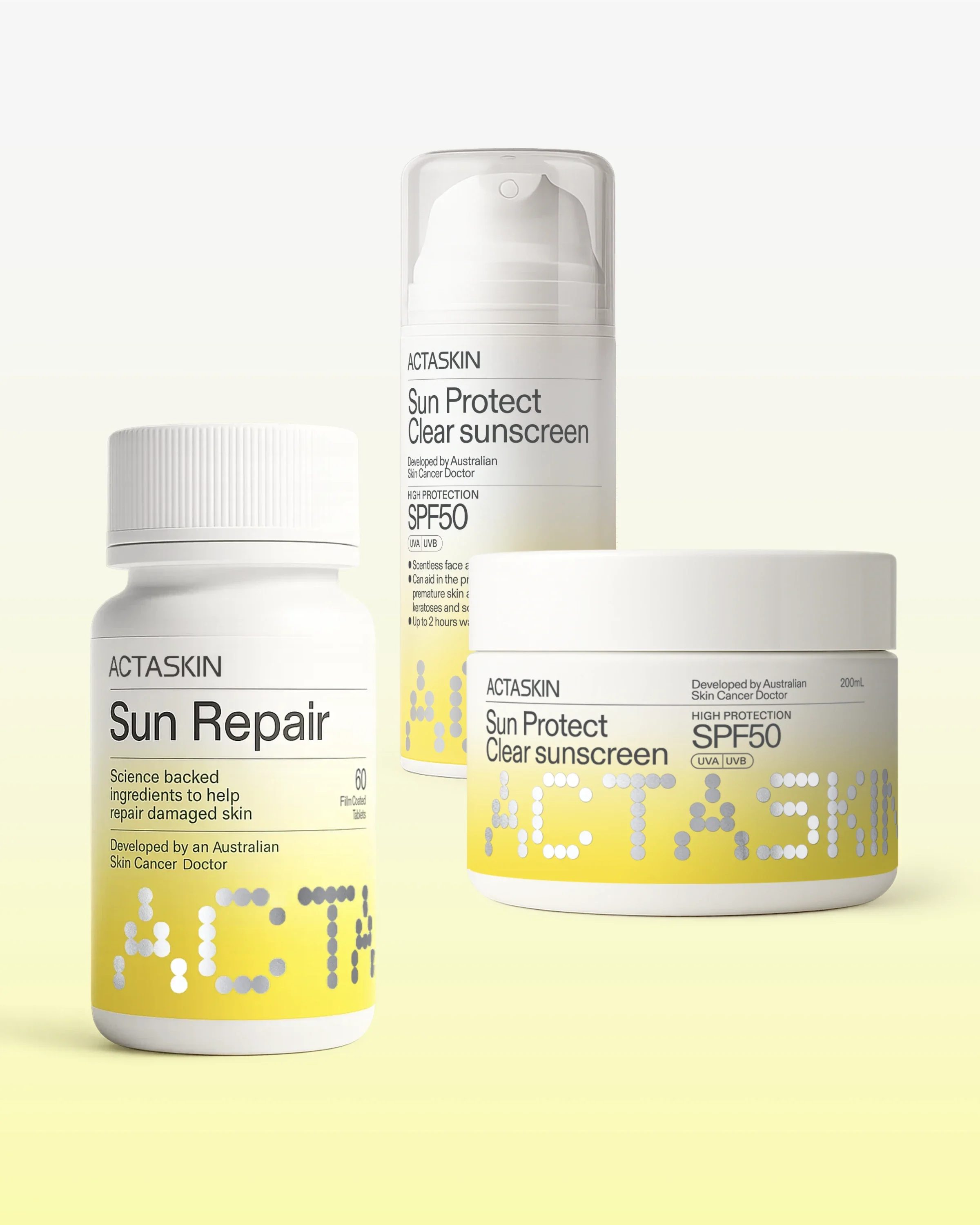
Clinically proven to help repair sun damaged skin
Formulated by an Australian Skin Cancer Doctor.
Lower your skin cancer risk^
With high-dose Nicotinamide, clinically proven to cut non-melanoma skin cancers in high-risk individuals.
Faster skin repair
By restoring NAD+ levels, your skin cells get the energy they need to repair DNA damage from sun exposure.
More hydrated, resilient skin
Sodium Hyaluronate draws in moisture. Astaxanthin helps lock it in improving elasticity and barrier strength.
Protection from premature ageing
Antioxidants fight back against UV-triggered oxidative stress to slow down fine lines and skin thinning before they start.
^Based on a Phase 3 clinical trial with 386 Australians with a history of skin cancer
Repair your skin’s damage
Clinically shown to boost your skin’s natural immune response by restoring energy, repairing DNA and rebuilding the skin’s barrier from daily UV exposure.
Clinical Results
The active ingredient is clinically proven to repair cellular damage and thus reduce some sun induce skin lesions^
- 20% reduction in Basal-layer keratinocyte growths
- 30% reduction in Squamous-layer keratinocyte growths
^Based on a Phase 3 clinical trial with 386 Australians with a history of skin cancer
What it delivers
A synergistic trio of cellular energiser, antioxidant protector, and deep skin hydrator that keeps skin healthy.
- Helps lower your risk of sun related skin lesions
- Slows visible signs of ageing, including wrinkles
- Improves skin moisture, texture and elasticity

Let customers speak for us
Mechanism of Action

Why we don’t use these ingredients
While certain nutrients are crucial for skin health, their efficacy through oral supplementation is often limited, and topical application or a balanced diet may be more effective for supporting skin health directly. We’d rather be honest about this than add ingredients that sound impressive but don’t actually benefit you — or your wallet.
No evidence for skin benefit: While biotin is essential for overall health, there is limited scientific evidence to support its direct effectiveness in improving skin health when taken orally. Most studies link biotin to hair and nail health, but not necessarily to skin conditions, and deficiency-related skin issues are rare.
Oral delivery insufficient for skin benefits: While vitamin C is a powerful antioxidant, its effectiveness in improving skin health through oral supplementation is limited due to poor absorption and metabolism. Vitamin C is known to be most beneficial for the skin when applied topically, as it directly reaches the skin tissue, whereas oral intake has to pass through the digestive system before reaching the skin, which reduces its efficacy for skin-specific benefits.
Limited evidence for skin benefit: While collagen is a critical component of skin structure, the benefits of consuming collagen supplements are debated. The body breaks down ingested collagen into amino acids, which may or may not be directed to the skin, limiting its direct skin-specific benefits. Studies suggest that oral collagen might have some impact on skin elasticity and hydration, but the evidence is inconsistent.
Limited scientific support for skin benefits: Luteolin is a flavonoid known for its anti-inflammatory and antioxidant properties. However, there is insufficient clinical evidence to support its direct benefit to skin health when taken orally. Most of the research on luteolin focuses on its general antioxidant and anti-inflammatory effects, rather than its specific impact on the skin.
Insufficient evidence for oral supplementation benefit to skin: Green tea contains polyphenols like EGCG, which are antioxidants and have anti-inflammatory properties. However, while green tea extract may provide some skin protection and anti-aging effects, research shows that the benefits of green tea for the skin are more pronounced when applied topically. Oral supplementation does not deliver enough of the active compounds to the skin to produce significant benefits.
No evidence for skin benefit: Glutathione is an antioxidant that is important for cellular health, but the scientific evidence supporting its oral supplementation for skin health is limited. Some studies suggest glutathione can reduce oxidative stress, but there is little evidence to show that taking glutathione orally improves skin tone, elasticity, or reduces wrinkles.
Potential for side effects and limited skin impact: Zinc is important for skin healing, wound repair, and immune function, and some studies suggest it may help with acne and inflammation. While zinc plays a role in skin health, excessive oral supplementation may not necessarily lead to better skin outcomes and may not be as effective as topical treatments for localised skin issues like acne or irritation. Oral zinc supplementation can cause side effects like nausea or gastrointestinal distress in some people.
Ask us anything
-
If you’ve spent time under the Australian sun, whether at the beach, on morning walks, or just through years of incidental exposure - Sun Repair is designed for you. It’s made for anyone who wants to actively support healthy, resilient skin that’s regularly exposed to the sun.
It’s especially beneficial for people who:
- Notice visible signs of cumulative sun exposure, like sun spots, uneven tone, or rough patches
- Notice visible signs of photoaging, such as fine lines, uneven tone, or loss of firmness
- Have fair or sun-sensitive skin (Fitzpatrick types I–III)
- Spend a lot of time outdoors, even with sunscreen (like outdoor workers, athletes, or active lifestyles)
-
If you’re taking two tablets daily, clinical studies show visible improvements in overall skin condition within 2 to 3 months. Many people notice smoother texture, improved hydration, and reduced redness even earlier, depending on their skin. The best results are typically seen after around 12 months of consistent use.
It’s important to note that nicotinamide’s benefits rely on continued use - in studies, improvements gradually returned to baseline within 6 months of stopping. For lasting skin health and resilience, think long-term consistency.
-
It’s recommended to take one tablet in the morning and one in the evening to help maintain a consistent level throughout the day. If you miss a dose, taking both together is fine. Staying consistent is what matters most for seeing results over time.
-
Nicotinamide is generally well tolerated, and both Sodium Hyaluronate and Astaxanthin have been shown to be safe for everyday use. In rare cases, some people may notice mild skin or digestive sensitivity, but this is uncommon.
As with any supplement, if you have individual health concerns or specific conditions, it’s best to check with your healthcare professional before starting to ensure it’s right for you.
-
This supplement is generally safe to take alongside most medications. However, if you are on any prescription medications or have underlying health conditions, it's always a good idea to consult with your healthcare provider to ensure there are no potential interactions.
-
Yes, this supplement is suitable for ongoing use when taken as directed. It’s been shown to help support skin health and build skin resilience over time. As with any supplement, if you plan to use it long term or have specific health considerations, it’s best to check with your healthcare professional.











